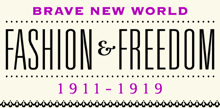Brave New World
April 7, 2011

The Philadelphia International Festival of the Arts (PIFA) is bringing 135 events and 1500 artists to Philadelphia for 25 days from April 7th to May 1st. In conjunction with PIFA, the Leonard Pearlstein Gallery will be hosting the exhibition Brave New World: Fashion and Freedom, 1911-1919 through May 7th. The exhibition will focus on the tumultuous years between 1911 through 1919; a period when the interplay between the fine arts and fashion was particularly strong. During this pivotal decade fashion changed dramatically and adventurous style-leaders cut their hair, abandoned their corsets and adopted shorter skirts. Clare Sauro, the curator of Drexel’s Historic Costume Collection, has selected garments from the collection with appropriate accessories. We will also welcome Rebecca Jumper Matheson, fashion historian and a faculty member in the History of Art department at the Fashion Institute of Technology, who will speak on Thursday, April 14th at 7 PM. Matheson’s lecture “Beyond Romanticism: The Art, Commerce, and Modernity of Lucile” will speak to the couturière Lucile (Lucy, Lady Duff Gordon, 1863-1935).
We’re also very proud that six Fashion Design seniors will participate in the PIFA Couture Fashion Show in the Kimmel Center’s Commonwealth Plaza tonight, Friday, April 8th at 8 PM. In a Paris-inspired runway show, nine top local designers and the student designers will have their work showcased on a 60-foot runway. Our students, Kristen Eissler, Harrison Johnson, Kristy Jost, Hailee Ashmore, MaryEllen Handy and Sara Mindel, have submitted their sketches, journal pages and inspiration boards so that their process will be visually illustrated as their garments appear on the runway. Additionally, Philadelphia native couture designer, Ralph Rucci, will be present to receive the Visionary Award for Fashion. Click here for more information and to purchase tickets to the show.
In 2005, Matheson co-curated the Museum at FIT graduate student exhibition Designing the It Girl: Lucile and Her Style, the first exhibition to focus on the life and career of the designer Lucile (Lucy, Lady Duff Gordon). Lucile embodied the spirit of an age: the transitional period around the turn of the 20th century through the 1910s. Best known for her romantic dresses, Lucile’s design repertoire also embraced a boundary-pushing exoticism, particularly for theater costuming, as well as a streamlined modernism evident in the suits she herself wore. The story of Lucile’s life also reveals her significance – as a divorced woman who continued to work even after remarriage made it unnecessary. Lucile was keenly aware of the increasing freedom women would enjoy in the 20th century.